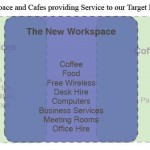LaunchPad CoWorking
An interview with Jerome Chang, founder of Blankspaces:
Spike: You’re also using a for-profit business model (as is LaunchPad Coworking). How did you decide on this model? Did you take any heat for it?
Jerome: I’m all for pushing collaboration and communities — if profit is what it takes to generate more participants and advance the cultural movement, then profit it is. Between the time and effort, money, and liability, we should be rewarded for that contribution and exposure. Besides, I didn’t know about coworking at all until I’d already started construction, so I was not “influenced†by the altruism.
I’m becoming more and more convinced that a Co-Working site needs to be a ‘company’ as opposed to a ‘charity’.
I’ve seen lots of non-profits fall by the wayside due to the founders needing to move on and it’s hard to find people with the right mentality to take over. I’ve seen non-profits founder because without the extra edge of needing to make a profit (and reaping benefits thereof) the good will can vanish.
I’m well aware that people working at a non-profit can draw salaries and that the non-profit moniker has been used in order to attract attention while the ‘workers’ draw insanely large salaries. I guess I’m not comfortable hiding behind the tax benefits of a non-profit while engaged in something that is creating things ‘for profit’.
But let’s run with the current school of thought. That CoWorkingBelfast will be a non-profit organisation.
That said – if I have anything to do with it, CoWorkingBelfast will have to be a shining light and not just a damp squib. I want it to be excellent, a model place to work and not just a set of desks in a dreary room above a bank. It has to make enough money to survive and prosper and not just be a half-empty space which has to resort to arcane marketing schemes disguised as trade shows in order to generate a bit of coin.
Part of the Co-Working Belfast ethos should, in my opinion, to create ‘industry culture’ in Northern Ireland. That’s got to be more than just creating a web portal (and how many of those have sprung up in the last year or so) but the creation of a lasting legacy, a tradition of fostering creativity in the technology sector. CoWorking is not about technology itself – it’s about connecting people where they were not previously connected.
Part of the culture of CoWorking Belfast should not only be the opportunities and connections which are brought about by proximity but also the potential for fostering tomorrow’s industry (you know, the people who will be paying taxes when you and I are in a home for the elderly). I have a plan which consists of nothing more than a couple of pledges, a holding page on a web site and a monthly bill which I’ll work to find sponsorship for – which will be wholly dedicated to finding people with energy, be they young in body or just young in mind, and giving them a place to work and express their creativity as well as providing mentoring (by using and abusing the people housed in the CoWorking building) – more on this later.
Through this meandering post I’m convincing myself that CoWorkingBelfast can be a no-profit. What do you think?
